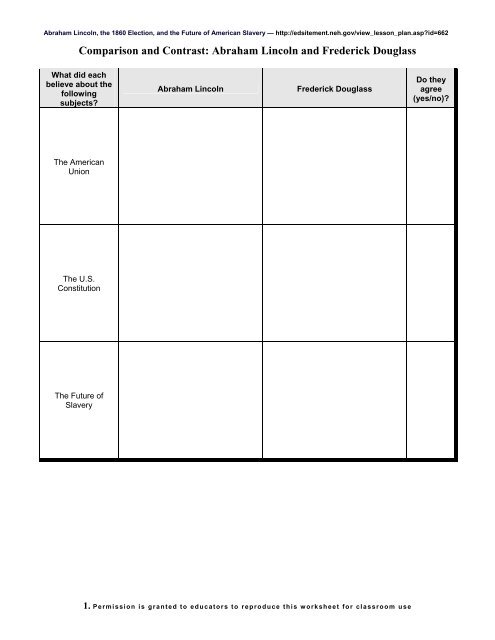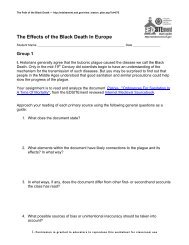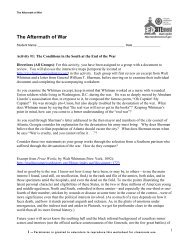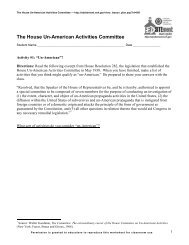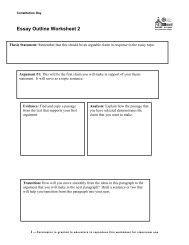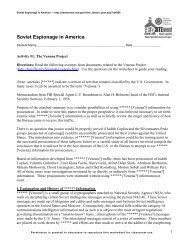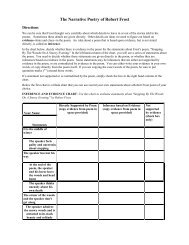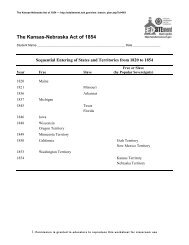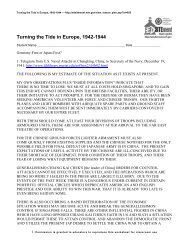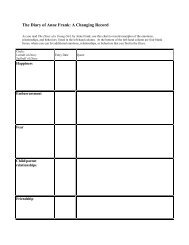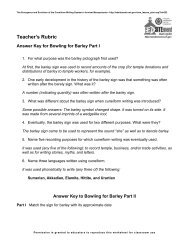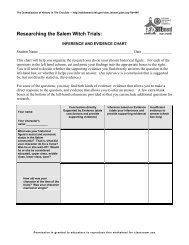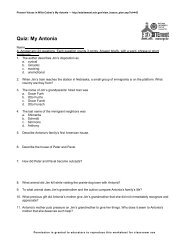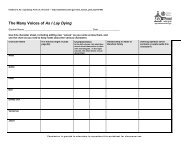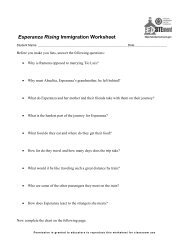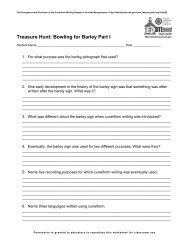Folklore: Some Useful Terminology - EDSITEment
Folklore: Some Useful Terminology - EDSITEment
Folklore: Some Useful Terminology - EDSITEment
Create successful ePaper yourself
Turn your PDF publications into a flip-book with our unique Google optimized e-Paper software.
Abraham Lincoln, the 1860 Election, and the Future of American Slavery — http://edsitement.neh.gov/view_lesson_plan.aspid=662<br />
Comparison and Contrast: Abraham Lincoln and Frederick Douglass<br />
What did each<br />
believe about the<br />
following<br />
subjects<br />
Abraham Lincoln<br />
Frederick Douglass<br />
Do they<br />
agree<br />
(yes/no)<br />
The American<br />
Union<br />
The U.S.<br />
Constitution<br />
The Future of<br />
Slavery<br />
1. Permission is granted to educators to reproduce this worksheet for classroom use
Abraham Lincoln, the 1860 Election, and the Future of American Slavery — http://edsitement.neh.gov/view_lesson_plan.aspid=662<br />
Abraham Lincoln, the 1860 Election<br />
and the Future of the American Union and Slavery<br />
Student Name ___________________________________________________ Date ________________<br />
Group 3: Textual Analysis of Stephen Douglas’s Speech and Letter<br />
Stephen Douglas, “Lincoln-Douglas Debates (1858): Second Debate at Freeport, Illinois,” Excerpt<br />
(August 27, 1858): http://www.nps.gov/liho/debate2.htm<br />
The next question propounded to me by Mr. Lincoln is, can the people of a Territory in any lawful way,<br />
against the wishes of any citizen of the United States, exclude slavery from their limits prior to the<br />
formation of a State Constitution I answer emphatically, as Mr. Lincoln has heard me answer a hundred<br />
times from every stump in Illinois, that in my opinion the people of a Territory can, by lawful means,<br />
exclude slavery from their limits prior to the formation of a State Constitution. Mr. Lincoln knew that I<br />
had answered that question over and over again. He heard me argue the Nebraska bill on that principle<br />
all over the State in 1854, in 1855, and in 1856, and he has no excuse for pretending to be in doubt as to<br />
my position on that question. It matters not what way the Supreme Court may hereafter decide as to the<br />
abstract question whether slavery may or may not go into a Territory under the Constitution, the people<br />
have the lawful means to introduce it or exclude it as they please, for the reason that slavery cannot exist<br />
a day or an hour anywhere, unless it is supported by local police regulations.... Those police regulations<br />
can only be established by the local legislature, and if the people are opposed to slavery they will elect<br />
representatives to that body who will by unfriendly legislation effectually prevent the introduction of it<br />
into their midst. If, on the contrary, they are for it, their legislation will favor its extension. Hence, no<br />
matter what the decision of the Supreme Court may be on that abstract question, still the right of the<br />
people to make a slave Territory or a free Territory is perfect and complete under the Nebraska bill. I<br />
hope Mr. Lincoln deems my answer satisfactory on that point.<br />
Question<br />
Answer<br />
Does Douglas believe the<br />
people of a federal territory can<br />
exclude slavery prior to<br />
becoming a state of the union<br />
Why does he think that a<br />
Supreme Court decision<br />
regarding slavery in the<br />
territories does not matter when<br />
it comes to the local wishes of<br />
the territorial population<br />
2. Permission is granted to educators to reproduce this worksheet for classroom use
Abraham Lincoln, the 1860 Election, and the Future of American Slavery — http://edsitement.neh.gov/view_lesson_plan.aspid=662<br />
What does he mean by<br />
“unfriendly legislation”<br />
Stephen A. Douglas, “Letter to J.B. Dorr” (June 22, 1859):<br />
If, as I have full faith they will, the Democratic party shall determine in the Presidential election of 1860<br />
to adhere to the principles embodied in the Compromise measures of 1850, and ratified by the people in<br />
the Presidential election of 1852, and re-affirmed in the Kansas-Nebraska act of 1854, and incorporated<br />
into the Cincinnati [Democratic Party] platform in 1856, as expounded by Mr. [James] Buchanan in his<br />
letter accepting the nomination, and approved by the people in his election—in that event my friends<br />
will be at liberty to present my name to the convention, if they see proper to do so.<br />
If, on the contrary, it shall become the policy of the Democratic party, which I cannot anticipate, to<br />
repudiate these their time-honored principles, on which we have achieved so many patriotic triumphs;<br />
and, in lieu of them, the Convention shall interpolate [or insert] into the creed of the party such new<br />
issues as the revival of the African slave trade, or a Congressional slave code for the Territories, or the<br />
doctrine that the Constitution of the United States either establishes or prohibits slavery in the Territories<br />
beyond the power of the people legally to control it as other property—it is due to candor to say that, in<br />
such an event, I could not accept the nomination if tendered to me.<br />
Question: Would Douglas’s letter encourage or discourage the following groups to support him as their<br />
nominee for president in 1860 For each group, write one sentence that explains your answer.<br />
Southern Democrats<br />
Northern Democrats<br />
Abolitionists<br />
Republicans<br />
3. Permission is granted to educators to reproduce this worksheet for classroom use
Abraham Lincoln, the 1860 Election, and the Future of American Slavery — http://edsitement.neh.gov/view_lesson_plan.aspid=662<br />
Comparison and Contrast: Abraham Lincoln and Stephen Douglas<br />
What did each<br />
believe about the<br />
following<br />
subjects<br />
Abraham Lincoln<br />
Stephen Douglas<br />
Do they<br />
agree<br />
(yes/no)<br />
The American<br />
Union<br />
The U.S.<br />
Constitution<br />
The Future of<br />
Slavery<br />
4. Permission is granted to educators to reproduce this worksheet for classroom use


